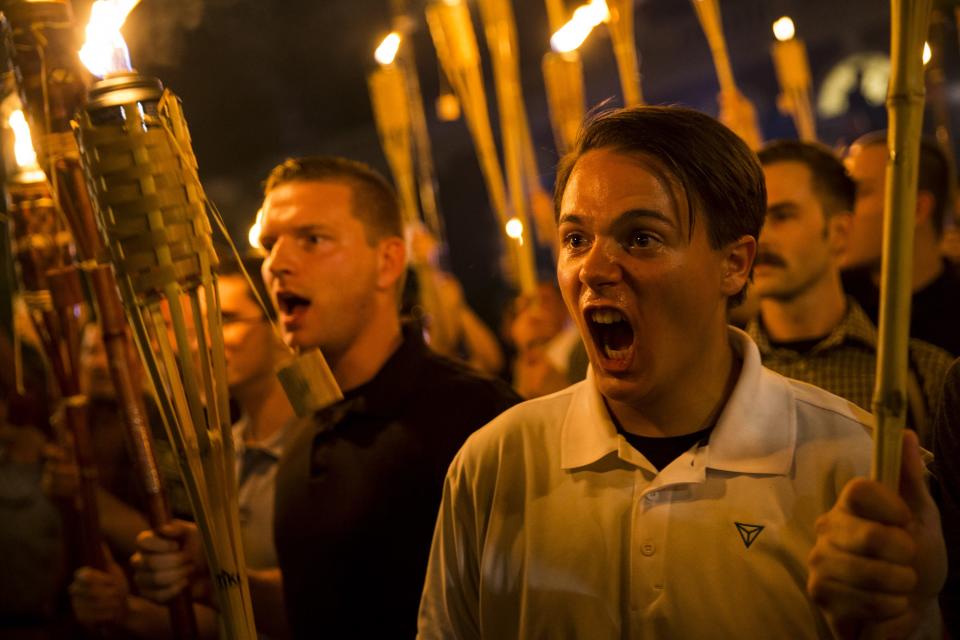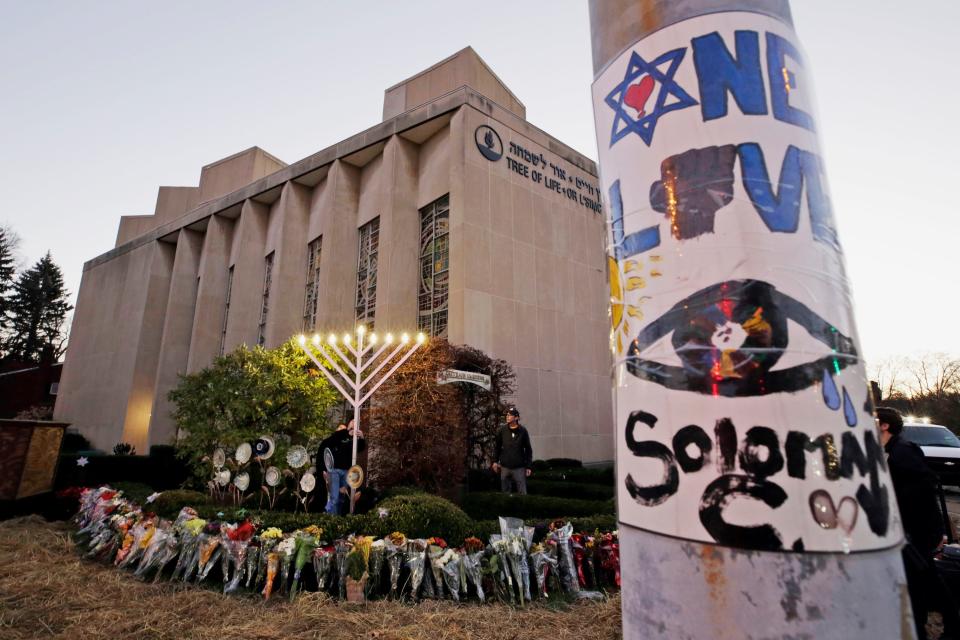As hate surges — in speech and acts — Americans have to learn to disagree again | Miraldi
- Oops!Something went wrong.Please try again later.
Maybe it started in Charlottesville, Virginia, in August 2017, when hundreds of white nationalists gathered to protest the removal of Civil War statues that applauded the confederacy. America was at the height of Trump-fueled chaos and the demonstrators chanted, "Jews will not replace us!" and "Russia is our friend!"
The counter demonstrators fired back with police stuck between angry sides. The mayor compared it to the old days of KKK rallies. What could have been a civil argument between contrasting factions, turned violent when a motorist — a Nazi sympathizer — drove into the crowd, killing a 32-year-old woman. He was sentenced to life in prison.

The then-president condemned no one, saying, infamously, that there were “good people on both sides.” I mean, really?
Or maybe it started at the Tree of Life synagogue in Pittsburgh in October 2018 when a 46-year-old man killed 11 during a Saturday morning service. Jews were bringing “invaders” to our country; he had to act. It was the deadliest attack ever on Jews in America.

Certainly — despite celebrating Martin Luther King Jr.'s values just this week — it hasn’t ended. Two days before Thanksgiving, Trump dined at his Mar-a-Lago estate with controversial rapper Kanye West, who has repeatedly made anti-Semitic statements. A month before he threatened, “When I wake up I’m going death con 3 On JEWISH PEOPLE.,” an apparent reference to violence.
Twitter banned him.
Trump welcomed him.
And he brought along one Nick Fuentes, a white supremacist leader and podcaster who makes Kanye look moderate. Trump said he did not know Fuentes. I mean, really?
“We are in a very bad period now,” Samuel Walker, a preeminent scholar and author of the 1994 book “Hate Speech” told me in a phone interview. “Anti-Semitism. Anti-immigration. People feel alienated. They’ve picked out an enemy.”
Actually, they’ve picked many enemies. The numbers are troubling. In 2021 anti-Semitic attacks reached an all-time high with 2,717 incidents, the highest since 2008. But hate crimes are up in all categories with a startling 339 percent increase against Asian-Americans.
And while hate speech is not the same as a hate crime, they are close relatives. Haters’ words can lead to bloodshed. Logic tells us to simply ban the haters from speaking.
But I have five reasons — I could give you more — why “hate speech” should not be banned or censored by the government, as desirable as that solution might seem.
American exceptionalism
America has long been considered an exceptional democratic nation. While most of the world has been and is authoritarian, we have clung to individual liberty and equal rights, including freedom of expression.
“We have been able to hold the line [on banning speech],” observes Walker. “In the international world, we stand alone. People don’t realize that. We took the values of the Bill of Rights and Declaration of Independence seriously.”
My European friends cannot understand how America tolerates neo-Nazis and the new KKK white nationalists.
Walker concedes that hate speech is “the difficult underside of our glory” but by protecting speech we perhaps despise and disagree with we underline America’s “exceptionalism.” Our words of brotherhood, so the thinking goes, are strong enough to overpower the words of the haters.
Is there a definition?
Trying to define the speech you wish to block is impossible and unwise. Most definitions of “hate speech” include disparaging words about race, religion, ethnicity, gender and sexuality. Increasingly LGBTQ categories have been included, but many feel that gives too much legitimacy to aberrant behavior.
But that begs the question of where we stop. Why not protect criticism of the elderly, obese, disabled? I’ve lost most much my hair. Can we punish someone who calls me a “bald old man”? Or a follicly challenged baby boomer? Facebook also protect refugees, migrants and immigrants in its hate speech policy.
The "slippery slope” is real. Would a coarse Chris Rock comedy routine on race be a violation? Jon Stewart, in receiving a lifetime award, apologized for how he has aged.
“Old Jews age like ripe avocados,” he joked.
Acceptable or anti-Semitic? Do we need a list of forbidden words? When I grew up, disabled people were called retards. Today that’s hateful. Where will it end?
We are allowed to hate
The 45 words of the First Amendment are a license for every citizen to think what they want and to express those thoughts, without government interference — our glorious freedom of thought clause.
No government — Republican or Democratic — can tell you that your belief is unworthy of protection. You might be condemned for saying it, but you cannot be silenced by the government. Facebook perhaps, but Biden no. You are allowed to hate people — for whatever reason.
Speech is protected — but crimes are not
But the United States Supreme Court has been quite clear in drawing lines. Expression is protected. Action is not. Partly because hate speech can have value. We can see — and watch — the bigots. And it often stops people from resorting to violence, like a pressure relief safety valve.
In a 1949 case, the court eyed another value. After the Rev. Arthur Terminiello, a suspended Roman Catholic priest, exhorted a crowd to violence with a Jew-baiting speech in Chicago, he was arrested for breach of peace. The Court said his words were protected.
“A function of free speech,” Justice William O. Douglas wrote, “is to invite dispute.” Speech “may indeed best serve its high purpose when it creates dissatisfaction with conditions as they are, or even stirs people to anger.”
Still, there must be some boundaries? Clarence Brandenburg tested the boundary in a 1964 rally when he said the KKK might seek revenge if the government continued to suppress white Americans. Brandenburg also said blacks should be returned to Africa and Jews to Israel.
But the Supreme Court said unless speech produced “imminent” lawless action, it’s protected. Walker explained, if they say, “Let’s go get them. Let’s do some damage to their buildings,” they can be arrested.
And the Court was even more forceful in protecting hate speech in 1985. Two Minnesota teenagers burned a cross on the lawn of a black family. A terrifying action. They were prosecuted under a state law that forbid using symbols of hate.
The law was declared unconstitutional. The First Amendment prevents government from punishing speech and expressive conduct because it disapproves of the ideas expressed.
Counter speech and fighting back
So, someone can trespass on my property and burn a cross without repercussions? Yes and no. Sure, as the Court pointed out, the teenagers should be prosecuted for illegal actions — trespass, arson and other violations of action. But the punishment is not because they spoke in a hateful manner.
The response should be counter speech. Bad speech deserves not censorship but repudiation, rebuke. Call them out at every turn. This is what leaders do; they don’t applaud “good people” who are bigots and haters. They educate.
I asked professor Walker if banning hate speech would make it disappear?
“It would not make it go way," he said. "Or reduce it. It might make it worse. Other groups will pop up. Education campaigns have to be dominant. It protects all of us.”
Trump is allowed to dine with the anti-Semites, Kanye and Fuentes. But when their supping is over, our job is to make them choke on their words. Call it electoral indigestion. Good people may disagree, but they don’t hate.
Rob Miraldi’s writing on the First Amendment has won numerous awards. He taught journalism at the State University of New York for many years. Twitter: @miral98 Email: rob.miraldi@gmail.com
This article originally appeared on Poughkeepsie Journal: U.S. Hate speech surges: Americans have to learn to disagree again

